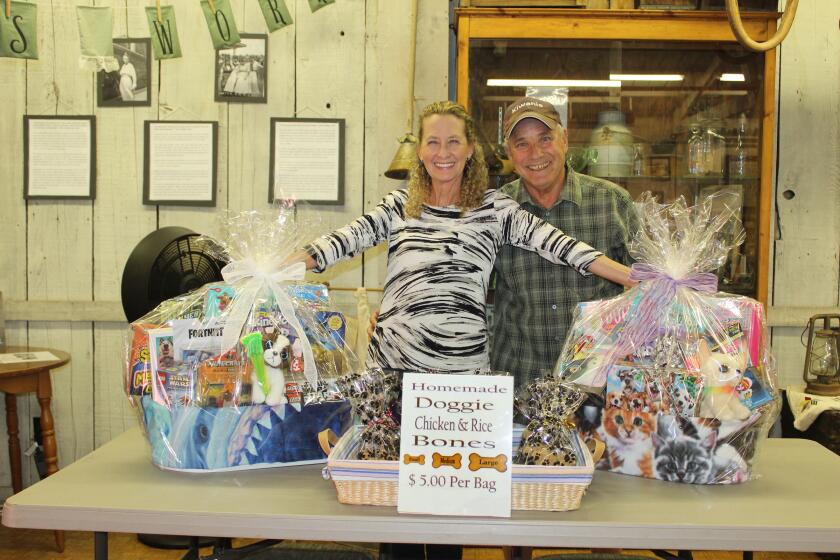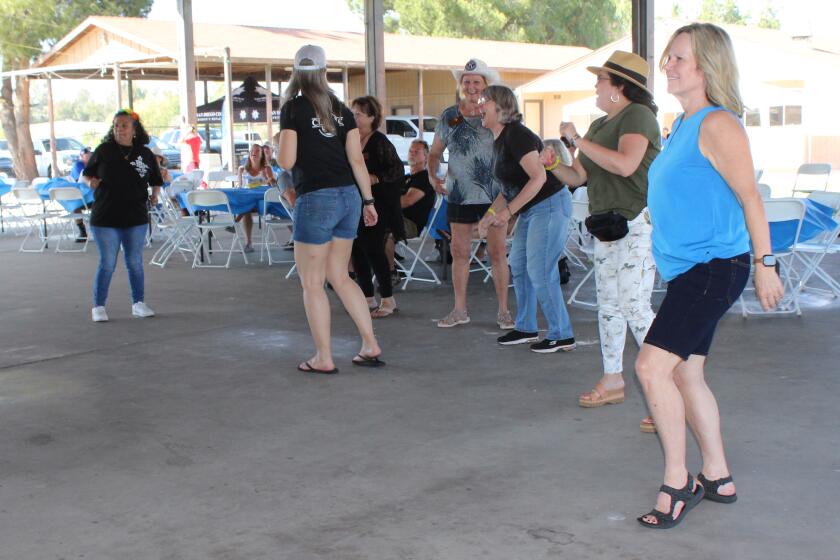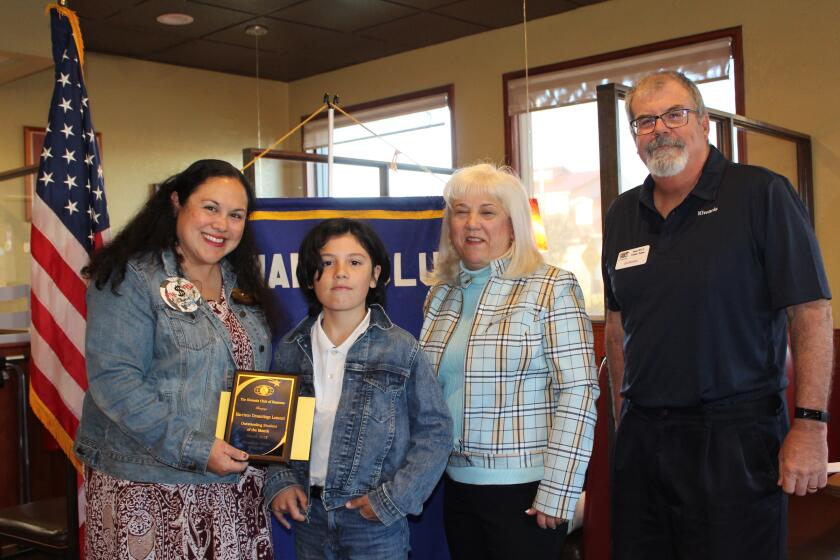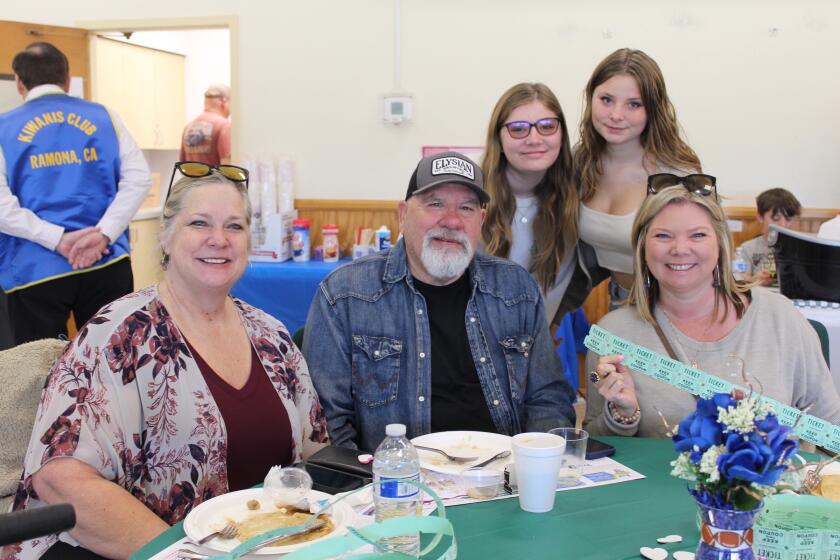Editor’s Note: This is the first in the Sentinel’s “Where Are They Now?” series about Ramona high school graduates—where they are and what they’re doing.By Karen BrainardCaroline Anderson, a 2002 Ramona High School graduate, knew she wanted to study economics in college but said she never expected to be working in Africa.Caroline Anderson visits the last wild giraffes in West Africa on a daytrip to a reserve in Niger that is a couple of hours from the capital of Niamey.“I was interested in doing international work but I didn’t know that it would necessarily be humanitarian work,” she said last week during her vacation at home in Ramona.The 28-year-old daughter of DeeAnn and Scott Anderson of Ramona was scheduled to head back to Niger on Tuesday.“I try to have a balance of exploring new things but staying connected to my roots, and it’s always nice to come back and spend time with my family and go to my old Ramona haunts,” said Anderson, who attended her 10-year-high school reunion during her visit.“I really enjoy traveling. I feel lucky to have a job that lets me do it, and pays me to do it,” she added with a laugh.Anderson’s current job is that of grants and program quality coordinator for Catholic Relief Services (CRS). Her work with CRS has taken her to three countries in West Africa in the past year—Benin, Liberia and NigerThe 2002 RHS valedictorian has an impressive academic resume, has traveled extensively, has many international friends, and has five little girls named after her in Africa.Anderson graduated in 2006 from University of California Berkeley with a bachelor’s degree in economics and a minor inCaroline Anderson leads a workshop for village healthcare providers before launching a micro-insurance pilot project in Benin in February 2012.French. During her junior year at Berkeley, she studied in France and traveled around Europe. After college, she joined the Peace Corps and served for three years in Cameroon in Central Africa.“I was working on micro finance and small enterprise development, teaching business classes to women,” she said of her work in Cameroon.She lived in a village of 10,000 that had a sense of community, she said, with neighbors treating her like family.When she noticed some of the women struggling to start small businesses, she offered to teach a basic business class. She taught them how to create a simple budget and do some marketing.“The women responded really positively,” said Anderson. “For a lot of these women it’s the first time they’ve had any economic independence.”farmland.DSC_0523.WEBfeatureNoting that girls get married as young as 14 and 15 years old, and many do not finish high school or even elementary school, Anderson said, “So things that might come naturally to Americans like a budget, they didn’t know how to do.”Their businesses were very basic, usually out of their homes, such as tailoring services or opening a restaurant that just served breakfast, she said.Anderson found her work in Cameroon to be rewarding, so she returned to the U.S. to continue her education with plans to return overseas. In 2011, she earned a master’s degree in International Affairs from Marquette University in Milwaukee, Wis. Just over a year ago, she began working for CRS.As an International Development Fellow in Benin, she managed a micro-insurance pilot project to bring health insurance to farmers. By collaborating with local private insurance companies, the program allows farmers to pay a minimal amount each month, giving them free visits to a local healthcare facility and covering 70 percent of treatment or medication.“This is a first for them. It seems to be working pretty well,” noted Anderson.While living in Cotonou on the coast of Benin, Anderson had a group of friends who were a mix of Europeans, Asians, Middle Easterners, Americans, and Africans.“It’s really fun to have such a diverse group of friends,” she said. “You really see how similar we all are in a lot of ways. You know everyone likes to go to the beach and have fun on a Sunday, relax after a long week at work. But it’s also great because we share our cultures.”They played music from their countries and had potluck nights where everyone shared a dish. The beach, she said, had strong waves, white sand, palm trees, and children walking around selling fresh coconuts.In Niger, she lives in a house with a pool—as it gets very hot—that is close to her office in the city of Niamey. For security reasons, Anderson said CRS has its international staff live close by the office “in case of any sort of security incident but it’s really a pretty stable country.”Anderson said she never feels in any danger and has guards at her house, which is pretty standard for international people living in nicer neighborhoods. When CRS staff travels to areas where they help refugees from Mali, a local military escort accompanies them, not because it’s dangerous but because of a potential for danger, she said.CRS has a number of projects in Niger. Some are long-term, such as irrigation for agriculture.“The rains are becoming more and more unpredictable,” she said, noting that has led to a food crisis. As a land recuperation project, CRS works with villagers who dig “half-moons” in the sun-baked earth to catch the water when it rains. Otherwise the land is so dry it does not absorb the rainfall, she explained.Anderson also helps with emergency projects such as distributing food to vulnerable households and distributing mosquito nets to prevent malaria, a disease she already experienced.“I’ve had some of the tropical diseases that scare my mom when I tell her. But generally it’s not terrible,” she said.After four years in Africa, Anderson said her body is probably more immune to stomach bugs.She described the food as very different, but healthy, without hormones and pre-processing.“I actually really like it. Everything is pretty fresh from the farm,” she said.Not only are the tropical fruits and vegetables fresh, but also the meat that comes from the free-roaming animals. If you want a chicken, you buy it, kill it and prepare it, she said.“I did it once. I figured if I’m willing to eat the meat I should be willing to kill it at least once,” she laughed. “It gives you a new appreciation, though, to know where our food comes from.”When her mother visited her in Cameroon and in Benin, Anderson said her African colleagues and friends invited DeeAnn Anderson over for dinners and gave her gifts.“I think a lot of African societies still place more of an emphasis on family and kind of a hierarchy than we do and so someone’s parents should be respected even more than them,” Anderson explained. “They always want to make sure she has the best time possible.”The attitude of the people remains positive, no matter how difficult life is, she noted.“People don’t let things get them down too much. People don’t tend to speak negatively,” said the humanitarian.Their general feeling is, Anderson added, ”Be thankful for what you’ve got.”
Readers with the name of a Ramona graduate for the “Where Are They Now?” series may email maureen@ramonasentinel.com or call 760-789-1350.




